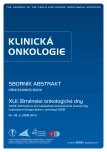Pilot Study on MicroRNAs as Biomarkers of Response to Sunitinib Treatment in Patients with Metastatic Renall Cell Carcinoma
Authors:
J. Kováčová 1; J. Juráček 1; A. Poprach 2; T. Büchler 3; J. Kopecký 4; O. Fiala 5; M. Svoboda 1,2
; M. Lojová 1; O. Slabý 1,2
Authors‘ workplace:
CEITEC – Středoevropský technologický institut, MU, Brno
1; Klinika komplexní onkologické péče, Masarykův onkologický ústav, Brno
2; Onkologická klinika 1. LF UK a Thomayerova nemocnice, Praha
3; Klinika onkologie a radioterapie LF UK a FN Hradec Králové
4; Onkologická a radioterapeutická klinika LF UK a FN Plzeň
5
Published in:
Klin Onkol 2018; 31(Supplementum1): 161-162
Category:
Article
Overview
Background:
Renal cell carcinoma (RCC) accounts for 2–3% of all malignant tumours. Metastatic RCC (mRCC) is commonly treated with tyrosine kinase inhibitors (TKI). Effective TKIs administration can be achieved only by accurate prediction of therapeutical response. Therefore, the aim of this study was to analyse papers concerning predictive potential of microRNA (miRNA).
Material and Methods:
We chose seven candidate miRNAs and analysed their expression on 44 patients divided into cohort with poor and good response to sunitinib treatment. Patients were divided into two groups according to progression-free survival. RNA from tissue samples was isolated and expression of selected miRNAs was measured using quantitative PCR with miRNA-specific TaqMan probes.
Results:
We successfully validated two miRNAs to be differentially expressed in responding and non-responding patients to sunitinib treatment. Other analysed miRNAs have not shown predictive potential.
Conclusion:
From miRNAs studied so far, two miRNAs had predictive value according to present study.
Key words:
microRNA – renal cell carcinoma – sunitib
The authors declare they have no potential conflicts of interest concerning drugs, products, or services used in the study.
The Editorial Board declares that the manuscript met the ICMJE recommendation for biomedical papers.
Supported by Ministry of Health of the Czech Republic, grant No. 15-34678A. All rights reserved.
Submitted:
19. 3. 2018
Accepted:
20. 3. 2018
Sources
1. Powles T, Staehler M, Ljungberg B et al. Updated EAU Guidelines for clear cell renal cancer patients who fail VEGF targeted therapy. Eur Urol 2016; 69 (1): 4–6. doi: 10.1016/j.eururo.2015.10.017.
2. Motzer RJ, Hutson TE, Tomczak P et al. Overall survival and updated results for sunitinib compared with interferon alfa in patients with metastatic renal cell carcinoma. J Clin Oncol 2009; 27 (22): 3584–3590. doi: 10.1200/JCO.2008.20.1293.
3. Friedman RC, Farh KK, Burge CB et al. Most mammalian mRNAs are conserved targets of microRNAs. Genome Res 2009; 19 (1): 92–105. doi: 10.1101/gr.082701.108.
4. Calin GA, Liu CG, Sevignani C et al. MicroRNA profiling reveals distinct signatures in B cell chronic lymphocytic leukemias. Proc Natl Acad Sci USA 2004; 101 (32): 11755–11760.
5. Merhautova J, Hezova R, Poprach A et al. miR-155 and miR-484 are associated with time to progression in metastatic renal cell carcinoma treated with sunitinib. Biomed Res Int 2015; 2015 : 941980. doi: 10.1155/2015/941980.
6. Gámez-Pozo A, Antón-Aparicio LM, Bayona C et al. MicroRNA expression profiling of peripheral blood samples predicts resistance to first-line sunitinib in advanced renal cell carcinoma patients. Neoplasia 2012; 14 (12): 1144–1152.
7. Berkers J, Govaere O, Wolter P et al. A possible role for MicroRNA-141 down-regulation in sunitinib resistant metastatic clear cell renal cell carcinoma through induction of epithelial-to-mesenchymal transition and hypoxia resistance. J Urol 2013; 189 (5): 1930–1938. doi: 10.1016/j.juro.2012.11.133.
8. Prior C, Perez-Gracia JL, Garcia-Donas J et al. Identification of tissue microRNAs predictive of sunitinib activity in patients with metastatic renal cell carcinoma. PLoS One 2014; 9 (1): e86263. doi: 10.1371/journal.pone.0086263.
9. Khella HW, Butz H, Ding Q et al. miR-221/222 are involved in response to sunitinib treatment in metastatic renal cell carcinoma. Mol Ther 2015; 23 (11): 1748–1758. doi: 10.1038/mt.2015.129.
10. García-Donas J, Beuselinck B, Inglada-Pérez L et al. Deep sequencing reveals microRNAs predictive of antiangiogenic drug response. JCI Insight 2016; 1 (10): e86051. doi: 10.1172/jci.insight.86051.
Labels
Paediatric clinical oncology Surgery Clinical oncologyArticle was published in
Clinical Oncology

2018 Issue Supplementum1
- Metamizole vs. Tramadol in Postoperative Analgesia
- Metamizole at a Glance and in Practice – Effective Non-Opioid Analgesic for All Ages
- Metamizole in perioperative treatment in children under 14 years – results of a questionnaire survey from practice
- Obstacle Called Vasospasm: Which Solution Is Most Effective in Microsurgery and How to Pharmacologically Assist It?
- Possibilities of Using Metamizole in the Treatment of Acute Primary Headaches
Most read in this issue
- MicroRNA Analysis for Extramedullary Multiple Myeloma Relapse
- A Development and Overview of the Use of Chemotherapy and the Role of Radiotherapy and Surgery in Patients with Newly Diagnosed Pancreatic Tumor and Cancer in the Current 5-year Center Practice
- Flow Cytometric Analysis of Nucleoside Transporters Activity in Chemoresistant Prostate Cancer Model
- MicroRNAs in Prediction of Response to Radiotherapy in Head and Neck Cancer Patients – Pilot Study
